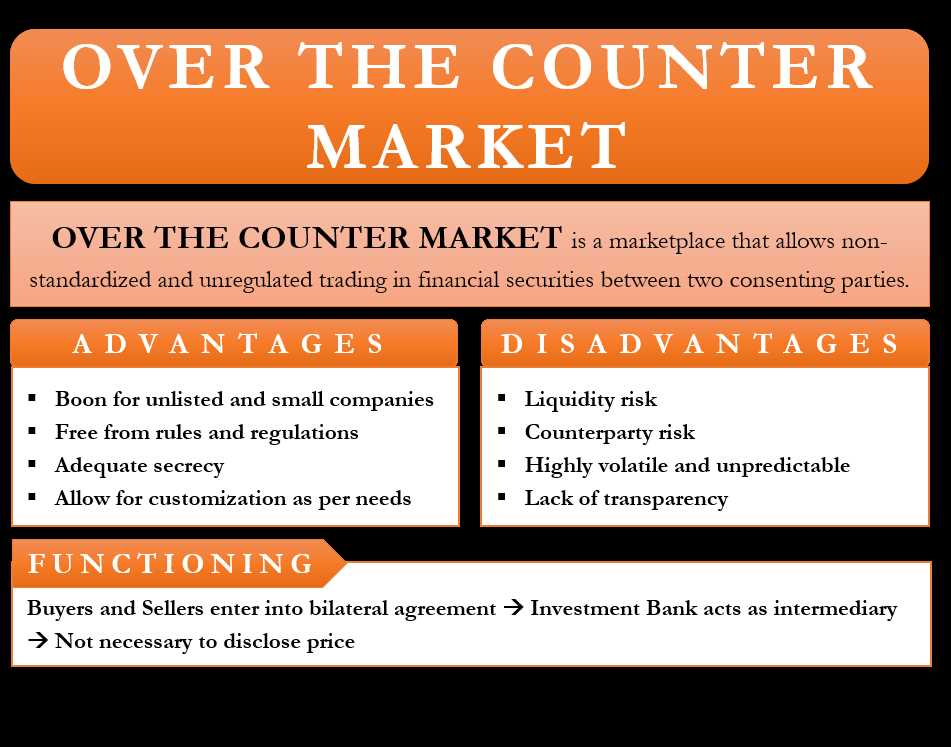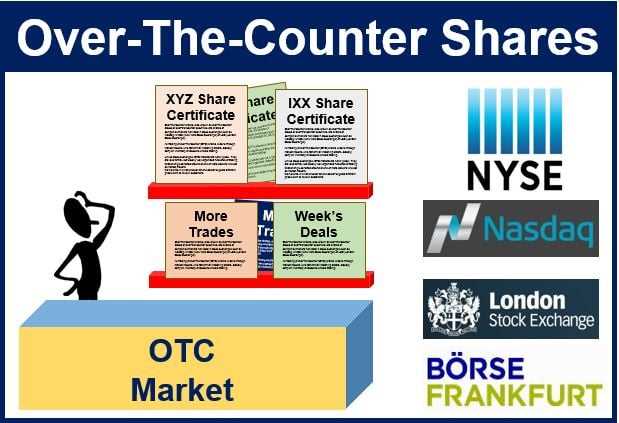What are Over-the-Counter Markets?

Over-the-Counter (OTC) markets are decentralized financial markets where trading of securities, such as stocks, bonds, and derivatives, takes place directly between two parties without the involvement of a centralized exchange. Unlike traditional exchanges, OTC markets operate through a network of dealers and brokers who facilitate the buying and selling of securities.
How do Over-the-Counter Markets Work?

OTC markets are particularly popular for trading securities that are not listed on formal exchanges or are thinly traded. This includes stocks of small companies, foreign securities, and certain types of debt instruments. By providing a platform for trading these securities, OTC markets offer investors access to a wider range of investment opportunities.
Key Characteristics of Over-the-Counter Markets
There are several key features that distinguish OTC markets from traditional exchanges:
- Lack of centralized exchange: OTC markets do not have a physical location or a central governing body.
- Dealer-based trading: Trading in OTC markets is facilitated by dealers who act as intermediaries between buyers and sellers.
- Greater flexibility: OTC markets allow for customized trading arrangements and negotiable terms.
- Limited regulation: OTC markets are subject to less regulation compared to formal exchanges, which can increase the risk of fraud and manipulation.
Advantages and Disadvantages of Trading in Over-the-Counter Markets
Trading in OTC markets offers several advantages, including:
- Access to a wider range of securities
- Greater flexibility in trading arrangements
- Lower transaction costs compared to formal exchanges
However, there are also some risks and disadvantages associated with OTC trading:
- Higher counterparty risk, as trades are not cleared through a central clearinghouse
- Lack of transparency, as OTC trades are not publicly reported
- Increased risk of fraud and manipulation
Overall, OTC markets play a crucial role in the global financial system by providing a platform for trading securities that may not be easily accessible through traditional exchanges. However, investors should be aware of the risks involved and exercise caution when trading in OTC markets.
Key Features of Over-the-Counter Markets
1. Lack of Centralized Exchange: One of the key features of over-the-counter (OTC) markets is the absence of a centralized exchange. Unlike traditional stock exchanges, OTC markets do not have a physical location where trading takes place. Instead, OTC trades are conducted directly between buyers and sellers through various electronic communication networks (ECNs) or over the phone.
2. Wide Range of Securities: OTC markets offer a wide range of securities that can be traded. This includes stocks, bonds, derivatives, and other financial instruments. Unlike traditional exchanges, OTC markets provide access to securities that may not be listed on major exchanges, allowing investors to trade in a more diverse range of assets.
3. Lower Regulatory Requirements: OTC markets generally have lower regulatory requirements compared to traditional exchanges. This means that companies listed on OTC markets may have fewer reporting obligations and disclosure requirements. While this can provide flexibility for smaller companies, it also poses risks for investors who may have limited access to information about the companies they are trading.
4. Less Transparency: Due to the decentralized nature of OTC markets, there is less transparency compared to traditional exchanges. OTC trades are often conducted privately, and price information may not be readily available to the public. This lack of transparency can make it more challenging for investors to assess the true value of securities and make informed trading decisions.
5. Higher Risk: Trading in OTC markets can be riskier compared to trading on traditional exchanges. The lack of centralized regulation and lower transparency can increase the risk of fraud and manipulation. Additionally, the liquidity of securities in OTC markets may be lower, making it more difficult to buy or sell assets at desired prices.
6. Market Access: OTC markets provide access to trading outside of regular market hours. This can be advantageous for investors who want to trade outside of traditional exchange hours or in different time zones. However, it also means that market conditions and liquidity may vary significantly during these extended trading hours.
7. Flexibility in Trading: OTC markets offer greater flexibility in trading compared to traditional exchanges. Trades can be customized to meet specific requirements, such as size, price, and settlement terms. This flexibility allows investors to negotiate directly with counterparties and tailor trades to their individual needs.
8. Counterparty Risk: OTC trades involve direct transactions between buyers and sellers, which exposes investors to counterparty risk. This risk refers to the possibility that the other party may default on their obligations, leading to financial losses. It is important for investors to carefully assess the creditworthiness and reliability of counterparties before entering into OTC transactions.
One of the key features of OTC markets is the use of market makers. Market makers are individuals or firms that facilitate trading by providing liquidity to the market. They do this by quoting both a bid price (the price at which they are willing to buy) and an ask price (the price at which they are willing to sell) for a particular security. Market makers play a crucial role in ensuring that there is a continuous flow of trading in the market.
Another important aspect of OTC markets is the use of negotiated transactions. Unlike on traditional exchanges where trades are executed based on a centralized order book, OTC trades are often negotiated directly between buyers and sellers. This allows for more flexibility in terms of price and quantity, as parties can agree on the terms of the trade based on their specific needs.
OTC markets also have less stringent regulatory requirements compared to traditional exchanges. This means that companies listed on OTC markets may not be subject to the same level of scrutiny and disclosure requirements as those listed on major exchanges. As a result, investors need to exercise caution and conduct thorough research before trading in OTC securities.
Benefits and Risks of Trading in Over-the-Counter Markets
Benefits of Trading in Over-the-Counter Markets
1. Accessibility: OTC markets provide access to a wide range of securities that may not be available on traditional exchanges. This allows investors to diversify their portfolios and potentially find unique investment opportunities.
2. Flexibility: OTC markets operate outside of regular exchange hours, allowing investors to trade securities at any time. This flexibility can be advantageous for individuals who cannot actively participate in regular trading hours.
3. Lower Costs: OTC markets often have lower transaction costs compared to traditional exchanges. This is because there are no intermediaries involved, such as brokers or market makers, which can reduce fees and commissions.
Risks of Trading in Over-the-Counter Markets
1. Lack of Regulation: OTC markets are generally less regulated compared to traditional exchanges. This can increase the risk of fraud, manipulation, and insider trading. Investors should exercise caution and conduct thorough research before engaging in OTC trading.
2. Limited Transparency: OTC markets often lack transparency, making it challenging for investors to obtain accurate and up-to-date information about the securities they are trading. This can increase the risk of making uninformed investment decisions.
3. Liquidity Risk: Some securities traded in OTC markets may have limited liquidity, meaning there may not be enough buyers or sellers to execute trades quickly. This can result in wider bid-ask spreads and potential difficulties in buying or selling securities at desired prices.
4. Counterparty Risk: OTC trades involve direct transactions between buyers and sellers, which exposes investors to counterparty risk. If the counterparty fails to fulfill their obligations, investors may suffer financial losses.
| Benefits | Risks |
|---|---|
| Accessibility | Lack of Regulation |
| Flexibility | Limited Transparency |
| Lower Costs | Liquidity Risk |
| Market Efficiency | Counterparty Risk |
Overall, trading in over-the-counter markets can offer unique opportunities and advantages, but it also comes with inherent risks. It is important for investors to carefully consider these factors and conduct thorough research before engaging in OTC trading.

Emily Bibb simplifies finance through bestselling books and articles, bridging complex concepts for everyday understanding. Engaging audiences via social media, she shares insights for financial success. Active in seminars and philanthropy, Bibb aims to create a more financially informed society, driven by her passion for empowering others.
